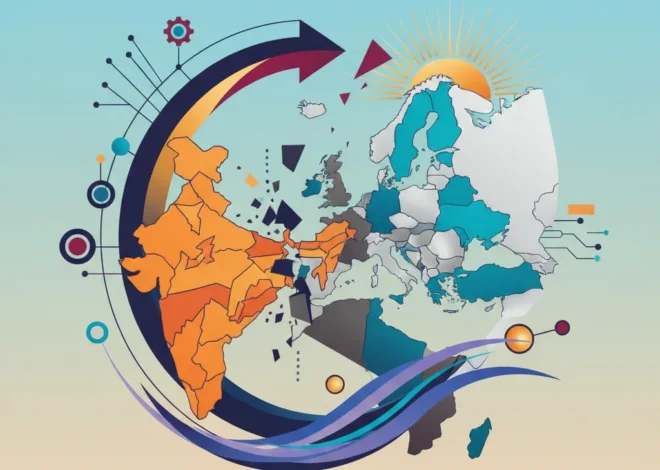
Beyond Oil: Why the UK’s New Economic Push into the Gulf is a Game-Changer
In the world of international economics, diplomatic visits are rarely just about handshakes and photo opportunities. They are calculated moves on a global chessboard, signaling strategic shifts and opening doors to immense capital flows. The recent visit by UK Chancellor Rachel Reeves to the Gulf is a prime example—a meticulously planned initiative aimed at deepening financial ties and securing a new wave of investment into Britain. As the BBC reports, the Chancellor’s hope is to pave the way for a broader trade agreement, but the implications run far deeper, touching every corner of the UK’s finance, technology, and investment landscape.
This isn’t merely about continuing a long-standing relationship; it’s about redefining it for a new era. In a post-Brexit world, the UK is actively forging its own economic path, and the cash-rich, rapidly diversifying economies of the Gulf Cooperation Council (GCC) represent one of the most significant opportunities on the planet. This charm offensive is a direct appeal to the gatekeepers of some of the world’s largest pools of capital, a move that could reshape the UK economy for years to come.
The Trillion-Dollar Prize: Understanding the UK-GCC Economic Symbiosis
To grasp the magnitude of this initiative, one must first understand the scale of the existing relationship and the potential for its expansion. The UK and the GCC—comprising Saudi Arabia, the United Arab Emirates, Qatar, Bahrain, Kuwait, and Oman—are already major economic partners. In the four quarters to the end of Q2 2023, total trade in goods and services between the UK and the GCC was a staggering £61.5 billion, accounting for 3.6% of the UK’s total trade.
However, the true prize lies not just in trade, but in investment. The Gulf is home to some of the world’s most powerful Sovereign Wealth Funds (SWFs), colossal state-owned investment vehicles that manage trillions of dollars in assets. These funds are increasingly looking to deploy capital into stable, high-growth, and innovative markets—a perfect match for the UK’s strengths in finance, life sciences, renewable energy, and financial technology.
Below is a snapshot of the immense financial power held by just a few of the region’s key SWFs, whose investment strategies are pivotal to the UK’s ambitions.
| Sovereign Wealth Fund (SWF) | Country | Estimated Assets Under Management (AUM) |
|---|---|---|
| Abu Dhabi Investment Authority (ADIA) | UAE | $993 Billion |
| Public Investment Fund (PIF) | Saudi Arabia | $925 Billion |
| Qatar Investment Authority (QIA) | Qatar | $475 Billion |
| Kuwait Investment Authority (KIA) | Kuwait | $923 Billion |
Data sourced from the Sovereign Wealth Fund Institute’s latest rankings. AUM figures are estimates and subject to market fluctuations.
These are not passive investors simply looking for returns on the stock market. Their mandates are evolving. They are strategic partners seeking to acquire stakes in critical infrastructure, fund cutting-edge R&D, and back the next generation of tech unicorns. For the UK, attracting even a fraction of this capital can translate into revitalized industries, significant job creation, and a stronger position on the global economic stage.
Gove's High-Stakes Gamble: Can a 1.5 Million Home Target Reshape the UK Economy?
Fintech and Financial Technology: The Digital Bridge to a New Era of Banking
One of the most exciting frontiers for UK-GCC collaboration lies in the realm of fintech and financial technology. London has long been the undisputed fintech capital of Europe, fostering a vibrant ecosystem of startups specializing in everything from digital banking and payments to regulatory technology and blockchain applications. Concurrently, the GCC nations are undergoing a massive digital transformation, driven by a young, tech-savvy population and government mandates to diversify away from oil.
This creates a perfect storm of opportunity:
- Market Access for UK Firms: British fintech companies see the Gulf as a high-growth market, hungry for innovative solutions in digital payments, wealth management, and Islamic finance technology. A formal trade agreement would streamline market entry and reduce regulatory friction.
- Capital for UK Innovation: Gulf SWFs and venture capital arms are actively hunting for promising fintech investments. Pouring capital into the UK’s fintech scene can accelerate the growth of startups, enabling them to scale globally and solidify London’s leadership position.
- Regulatory Collaboration: As both regions grapple with the complexities of digital assets, central bank digital currencies (CBDCs), and AI in trading and banking, collaboration between regulators can create a harmonized framework. This could establish a “digital finance corridor” that fosters safe and efficient cross-border innovation.
The potential for synergy here is immense. Imagine UK-developed blockchain technology being used to streamline trade finance between the Port of Felixstowe and Jebel Ali Port in Dubai, or a Qatari-funded London startup revolutionizing cross-border remittances. This is the tangible future that Chancellor Reeves’ visit aims to unlock, moving beyond traditional economics into the very architecture of the future financial system.
Indonesia at a Crossroads: Analyzing Economic Realities in Prabowo's First Year
The Broader Economic Canvas: Implications for Investors and the UK Economy
A successful trade and investment pact with the GCC would send ripples across the entire UK economy. For investors and business leaders, the implications are multifaceted and warrant close attention.
Firstly, it would signal a major vote of confidence in the UK’s post-Brexit economic model. Attracting significant, long-term capital from sophisticated state investors like the PIF or ADIA would bolster market sentiment and could positively impact the value of the pound and the attractiveness of UK assets. This could provide a much-needed boost to the London stock market, potentially attracting more international listings and increasing liquidity.
Secondly, the investment would likely target specific, high-priority sectors. The UK government has been clear about its ambitions in green energy, life sciences, and technology. Gulf investment in these areas could accelerate the UK’s transition to a net-zero economy, fund the construction of new battery gigafactories, and finance groundbreaking medical research. For those investing in these sectors, a UK-GCC deal could act as a powerful catalyst.
However, challenges remain. The negotiation of any free trade agreement is a complex process, fraught with political and regulatory hurdles. Competitors are not standing still, and the UK must continue to prove it is the premier destination for global capital. Furthermore, integrating such large-scale investment requires careful management to ensure it translates into widespread economic benefit rather than isolated pockets of wealth.
Conclusion: A Strategic Pivot with Long-Term Potential
Chancellor Rachel Reeves’ trip to the Gulf is far more than a routine diplomatic mission. It is a clear and decisive signal of the UK’s strategic economic direction. By actively courting the world’s largest sovereign wealth funds and pushing for a comprehensive trade agreement, the UK is positioning itself as a primary partner for the Gulf’s ambitious diversification plans.
The convergence of UK innovation in fields like fintech and green technology with the immense capital and strategic vision of the GCC presents a once-in-a-generation opportunity. If successful, this partnership could unlock billions in investment, fuel the next wave of technological advancement, and secure a more prosperous and resilient future for the UK economy. For finance professionals, investors, and business leaders, the message is clear: watch this space very closely. The economic landscape is shifting, and the ties being forged today will define the flow of global capital for decades to come.


